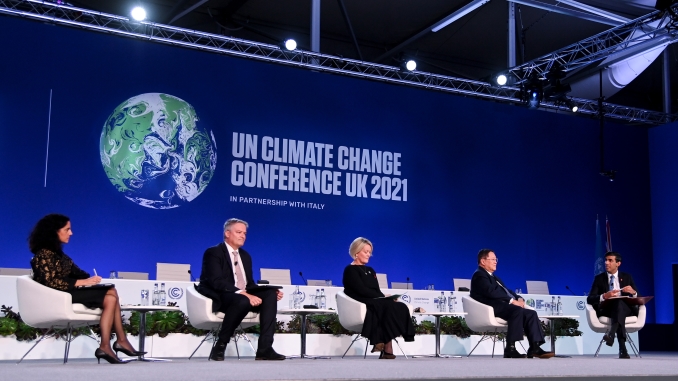
Net zero ambitions abounded during the Finance Day of the COP 26 Presidency Programme in Glasgow on Wednesday, with a Mark Carney-led alliance touting a $130tn headline figure, but critics questioned whether such pledges are sufficient.
Opening the Finance Day, UK Chancellor of the Exchequer Rishi Sunak committed £100m (€117m, $135m) to the Taskforce on Access to Climate Finance, and support for a new Climate Investment Funds (CIF) Capital Market Mechanism, which he said will issue billions of new green bonds in the UK to fund renewable energy in developing countries.
“I’m proud that the UK is playing its part,” he said, “We’ve already made it mandatory for businesses to disclose climate-related financial information, with 35 other countries signing up to do the same.
“Today I’m announcing that the UK will go further and become the first ever ‘Net Zero Aligned Financial Centre’. This means we are going to move towards making it mandatory for firms to publish a clear, deliverable plan, setting out how they will decarbonise and transition to Net Zero – with an independent taskforce to define what’s required.”
Sunak said the intention is to “rewire” the entire financial system for net zero, with better and more consistent climate data, sovereign green bonds, mandatory sustainability disclosures, proper climate risk surveillance, and stronger global reporting standards. The UK issued its own first green Gilt on 21 September, a £10bn 12 year deal.
“But public investment alone isn’t enough,” added Sunak. “Our second action is to mobilise private finance.”
He highlighted the announcement by a group of more than 450 firms, the Glasgow Financial Alliance for Net-Zero (GFANZ) launched in April, that financial sector commitments to net zero now exceed $130tn. All initiatives in GFANZ require signatories to set science-aligned interim and long term goals to reach net zero no later than 2050, in line with the criteria of the UN Race to Zero campaign.
“With GFANZ, we have all the money needed for the transition,” said Mark Carney, co-chair of the alliance. “Our job is to find the plumbing to make it work.”
Nordea analysts saw the focus on net zero across central banks, regulators and supranational bodies as unprecedented, and said the day’s proceedings evinced mounting expectations that the financial sector considers the climate in “each and every financing decision made”.
However, a looming question was whether commitments made before during COP26 will be sufficient to bring the world nearer to 1.5 degrees Celsius of warming, they added, noting that even the full implementation of emissions and methane cuts made by countries would only limit temperature rises to 1.8 to 1.9 degrees, according to information released on Thursday by bodies including the International Energy Agency (IEA), EU and University of Melbourne.
And the promises being made on Finance Day met with scepticism in some quarters, with critics, for example, questioning the $130tn figure and the rigour of the initiative.
“It is exciting to see the sheer quantity of new net zero commitments from banks and investors,” said Ben Caldecott, director of a University of Oxford sustainable finance group and COP26 strategy advisor for finance to the UK Cabinet Office, for example. “$130tn of assets with net zero targets is a 25-fold increase since the UK took on the COP26 Presidency in 2019.
“But we urgently need to focus on the quality and integrity of these promises, not simply their quantity.”
He said that almost none of the $130tn GFANZ figure is net zero today, and that it is not dedicated toward climate solutions.
“These assets are not fossil fuel free and new fossil infra is still being financed,” he added. “We have lots more to do together!”
The IFRS Foundation meanwhile announced the establishment of the International Sustainability Standards Board (ISSB).
“Its purpose is to develop, in the public interest, a comprehensive global baseline of sustainability disclosures for the financial markets, IFRS Sustainability Disclosure Standards,” said Erkki Liikanen, chair of the IFRS Foundation Trustees.
The Value Reporting Foundation (VRF), home to the Integrated Reporting Framework and SASB Standards, and the Climate Disclosure Standards Board (CDSB) will be consolidated into the new set-up.
Liikanen also announced the publication of prototype climate-related disclosures and general sustainability disclosure requirements that have been prepared by the technical readiness working group within the IFRS.
“The aim is to consolidate key aspects of this content into an enhanced, unified set of recommendations for consideration by the ISSB,” he said.
Vlad Mitroi, head of ESG at Chenavari Investment Managers, was among those to welcome the move.
“We need a set of global sustainability accounting standards to uphold the integrity of the sustainable finance market,” he said, “especially as we look to allocate trillions of capital for our society’s transition to net zero by 2050.
“The EU took the lead in April this year with its Corporate Sustainability Reporting Directive – but global investors need global standards.”



